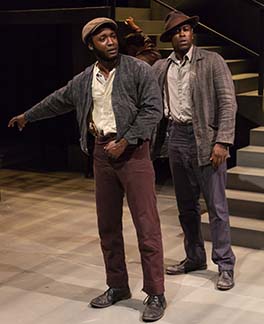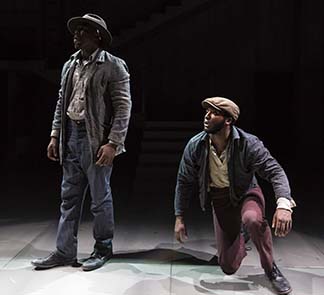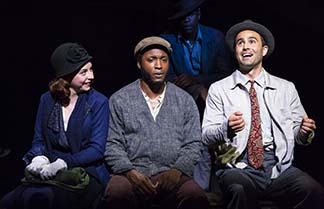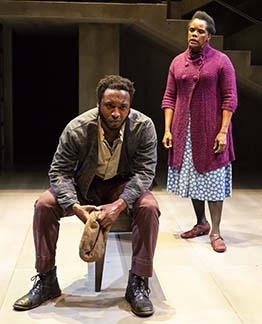By Lucy Komisar
Galen Ryan Kane gives a shattering performance as Bigger Thomas, the anti-hero victim of Nambi Kelley‘s bravura take on Richard Wright‘s 1940 novel of the desperation of inner-city black men.
It‘s the South Side of Chicago, a cold wintry day in 1939. Bigger, in his 20s, is angry and, inside, as bleak as the weather, furious at all the things white people won‘t let him do, even then unrealistic dreams like learning to fly a plane. He is so despairing at life that he takes chances plotting a petty deli robbery at a time when he‘s about to start a job driving a car for a rich and socially prominent white family.

Kelley tells the story with stunning imagination, inventing the Black Rat (Jason Bowen) as Bigger‘s alter ego, as she explains it, “the voice inside Bigger‘s head, the physical manifestation of Bigger‘s double consciousness, or how Bigger sees himself through the eyes of others.”
The playwright thanks her father, filmmaker and historian Don Quinn Kelley, for teaching her about W. E. B. Du Bois‘ theory of double consciousness as articulated in Du Bois‘ The Souls of Black Folk.
The staging by director Seret Scott is naturalistic and surreal at the same time. It‘s a thriller drawn with inner desolation and doom.
Bigger is twisted, coiled, driven. As the Black Rat explains, “We all got two minds. How we see them seeing us. How we see our own self. But how they see you take over on the inside. And when you look in the mirror – You only see what they tell you you is. A black rat sonofabitch.” But his voice warns, “Don‘t do it, don‘t rob Blum‘s.”
But as Bigger sees no future, his other life is all unrealistic plots or fantasy. He plays at being JP Morgan on the phone. Then he is the President talking to a general, telling him to attack Negroes.
Reflecting his thoughts, the events and the scenes shift back and forth in time. The scenes are disjointed, real and imaginary.
The crucial event is driving home a drunk Mary (the very good Rebekah Brockman), the born-to-the-manor radical daughter of his employers. Brockman makes her body go so limp you think you can pour it.
As Mary slides through his arms that are trying to hold her up, he manages to deposit her on her bed. She grabs for him, and as he hears her mother approach, he panics and puts a pillow over her face to keep her quiet.

After her mother withdraws, he discovers Mary is dead. The irony is that Mrs. Dalton (Laura Gragtmans) is blind and he could have snuck out without her realizing he was there.
Bigger thinks “Dead?” The Black Rat repeats it. Bigger: “And I killed her?” The Black Rat: “And I killed her. A rich white girl. I am a murderer. A Negro murderer. A Black murderer.”
Bigger says: “They will kill me.” The Black Rat repeats it. Bigger now can hear no other voice. We hear the plaintive notes of a horn.
Shift backward in time. He gets the chauffeur job. He sees a clip of Mary on TV betraying her class by kissing a Communist. When he meets her, she inquires, “Do you belong to a union?” “Mary, please!” exclaims her mother. “He doesn‘t even know what a “capitalist” is. Forgive her, Bigger.” And, “My daughter. I‘m sure you‘ve seen her on the newsreels running off with that Communist?”
But Mrs. Dalton is the good liberal. She notes, “And we are supporters of the National Association for the Advancement of Colored People. Did you ever hear of that organization?” Recall the book is 1940.
Still, she says, “the relief people said like most black boys you were in reform school and always in trouble. My husband was a boy once, we think we can understand these things. He even was in such a place. Once. Well, not quite. A…boarding school.” And “We are more alike than it seems, Bigger.”

No, they aren‘t. They don‘t inhabit the same planet.
When Bigger takes Mary out in a car, she detours to pick up Jan (Anthony Bowden), a Communist, who tells him, “We are comrades.” They insist Bigger joins them in drinking from a flask.
Bigger‘s father was killed when he was 8, and he sees no way out of that legacy. Jan says, “Don‘t you think we could stop things like what happened to your father? Like those Scottsboro boys, don‘t you think we did a good job keeping ˜em from killing them?”
The Black Rat interjects, “I‘d rather have died than what they got. Don‘t say that.”
Jan promises that after the revolution, “there‘ll be no rich and no poor, no white and no Negro.“ He gives Bigger a pamphlet. By now they‘ve drunk a lot and start singing “Swing Low, Sweet Chariot.” Mary wants to sing his people‘s music. But the real music is the jazz guitar and lonely horn (music by Frederick Kennedy) that help connect us to the ambiance.

Back to the present, as Bigger plots to cover his guilt, to hide the body, to cast blame, his mother Hannah (the fine Rosalyn Coleman), a strong “come to Jesus” woman, is overcome by events.
And the plot will envelop his sometime girlfriend Bessie (a very good Katherine Renee Turner), who drinks too much to cover her unhappiness.
Bigger is ensnared by chance evidence. Britten the private investigator (Henry Jenkinson) embellishes to the press, “This is a sex crime.” And “the police are going to search every Negro home until we get the black bastard.”
When Bigger and his alter-ego flee and hide, the scene seems choreographed. Their running up stairs is mimed by running in place. The bass plays dark notes.
Set designer Neil Patel has created a terrific realistic deus ex machina red furnace in the midst of a space that is just a collection of brown wood benches and a gray steel sculpture of stairs and landings.
With the help of a very talented Acting Company cast, Kelley and Scott have crafted a theatrical gem out of Wright‘s searing novel.
“Native Son.” Written by Nambi E. Kelley, based on the 1940 novel by Richard Wright; directed by Seret Scott. A presentation of The Acting Company The Duke, 229 West 42nd Street, New York City. 646-223-3010. Opened July 28, 2019, closes August 24. Running time 90 min. 8/19/19. Also on NY Theatre Wire.

